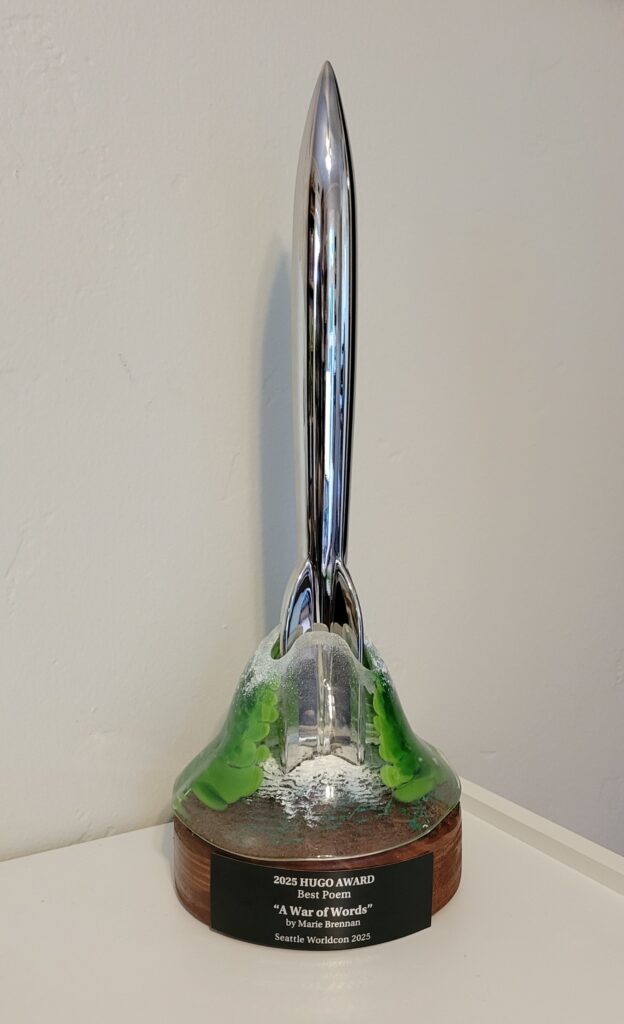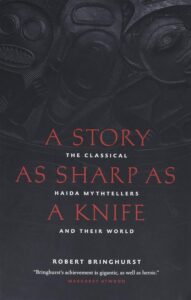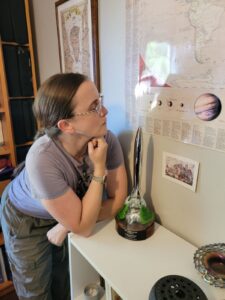by Holly Lyn Walrath

At Worldcon 2025, speculative literature marked a historic moment: the first Hugo Award ever issued for a poem. Nominees ranged from shorter works from magazines such as Uncanny, Strange Horizons, and Haven Spec, to a book-length epic, Calypso by Oliver K. Langmead. Voted on by the World Science Fiction Society (WSFS) membership, this category could be ratified in two years for permanent inclusion. 2025 is also the first year of eligibility for a Nebula Award for Best Poem, to be awarded in June 2026.
For speculative poets, having poetry categories in major awards recognizes an underrepresented genre that actually predates speculative fiction. From Gilgamesh to Homer to the Vedic hymns, the speculative and the sacred collided, and oral storytelling traditions meant poetry was at the heart of ancient literature. That throughline has continued from the birth of high fantasy in the Old English period to the fairy fancies of the Tudors to the ghostly graveyard poems of Gothic literature—up to today’s thriving contemporary poetry scene.
Research from the Speculative Poetry Initiative indicates that in 2023–24, at least 50 magazines published speculative poetry. A Hugo for poetry was long overdue, and having poetry on the ballot means that fans are learning to seek out speculative poetry, which might have previously felt like mysterious and unexplored terrain.
Marie Brennan’s Hugo-winning poem “A War of Words” (Strange Horizons) is a stunning introduction for those new to the medium. I chatted with Marie about the win, the myths surrounding speculative poetry, and why poetry has always been at the margins—or has it?

How does it feel to be the first-ever winner of the Hugo Award for Speculative Poetry?
Like somebody wrote this odd fantasy story about my life!
Your Hugo-winning poem is only your fourth published poem, which is pretty incredible, although, of course, you’ve written lots of fiction. How did you get into writing speculative poetry?
Much the same way I got into writing short fiction, which is to say, I stumbled into it without quite meaning to. I keep a list of unwritten story ideas, and periodically I’ll look through it to see if anything jumps up and says, “Me! I’m ready to go!” In early 2021, I was perusing that list and reflecting that some of the ideas had been there so long, I doubted they would ever go anywhere. They didn’t have enough meat on the bone; they were just kind of “here is a neat thought, the end.”
…and a tiny voice from my subconscious whispered, “What if…poem instead?”
This was very odd for me. I’m not one of those people who used to write poetry and then stopped —I didn’t even write angsty poems in high school! I did a few in elementary school for an assignment; I wrote several tanka for a Legend of the Five Rings game I was running because it fit the setting and my players were writing poetry too; I wrote one bit of free verse for a novel because the story seemed to call for it (and if readers thought it was a bad poem, that was fine, because nobody claimed that character was a literary genius). I’d made one attempt at a sestina many years ago—again because the idea didn’t seem to be working as a story—but it didn’t turn out well, and I hadn’t tried again. So this was the first time I’d ever wanted to write a poem for its own sake and liked the result.
And not long after that, a second, brand-new idea mugged me: “Damnatio Memoriae,” which became the first one I sold. Was I…writing poetry now? Was this going to be a recurrent thing? Turns out the answer to that is “yes.”
One of the things I love about “A War of Words” is how the metaphor can be interpreted. One might read it and view it as speech against censorship, while for me, it draws up memories of struggling with my own dyslexia and word-finding. How do you consider the reader/audience when writing your poems?

The inspiration came from a story narrated by the Haida storyteller Kilxhawgins, quoted in Robert Bringhurst’s book A Story as Sharp as a Knife, in which young men on a raid seem to steal the odd cry of delight they hear some women making (along with other, more material loot). Because of that, I think of the poem as being about what colonialism does to Indigenous languages—but you’re right, it can be read in other ways, touching on censorship or aphasia or anything else that involves a loss of language. And I like that a lot, because I think it’s a stronger poem when it can support multiple interpretations.
But I generally only consider those things after the fact. Some writers work theme-first; for me, that tends to produce deadly boring results. I feel I get the best effect when I chase a shiny idea, then step back and notice what I just said. And then I try to find an audience (i.e., an editor) that wants to buy it!
Poetry is often put on a pedestal, by which I mean that many readers associate poetry with something hard to read that requires a lot of special knowledge to understand and enjoy. Where do you think this myth comes from, and how does speculative poetry dispel it?
With the caveat that I’m not deeply educated in this history, I blame the mid-twentieth-century literary establishment. They decided no more rhyme, no more meter, no more narrative; modern poetry should be free verse only, the denser the better, and the best poems are the ones that have to be studied and analyzed before you can understand them. If the average person enjoys a poem for its surface characteristics, it’s not very good poetry.
Shocker: That resulted in poetry getting shoved to the margins.
Except it’s not as marginal as we may think. Not all poets agree with this, but I firmly believe that song lyrics are poetry, and rap is the most thriving verse genre we’ve got nowadays. If you enjoy those things, then you enjoy poetry. Breaking down that separation, so that “poetry” is no longer this elite, abstruse art, while lyrics are “something else”—as far as I’m concerned, that can only be good for the health of poetry.
As for speculative poetry specifically…I mean, it’s not like the literary establishment wants to give us the time of day in the first place. So we’re free to write and read whatever we like, whether that’s the dense, chewy free verse or the rhyming pantoum about a woman who hasn’t noticed the zombie apocalypse underway. (Yes, that’s one of my unsold poems.)
Do you ever write poems just for fun?
Absolutely! That’s another thing I want people to believe: that while poetry can make profound statements about the human condition, it can just as easily be for incidental things too. In cultures where poetry thrives, it’s woven much more deeply into everyday life. I think of it like snapping a picture with your phone: You want to record the moment, even if you aren’t going to print and hang that shot. Maybe you write a poem about a funny thing your cat did, or your inability to cook dinner without flipping bits of food onto the stove or the floor. (Yep, I’ve written that latter.) Why shouldn’t you record moments of your life in verse?
What makes a poem a poem? Where does the line lie, for you, between prose and poetry?
I don’t remember who this originates with, but I like the framework that says poetry is a quality that can be possessed by both prose and verse: an artfulness of language, which verse tends to emphasize more, but prose can employ too. That framework helps make sense of the existence of “prose poem” as a concept—though it doesn’t help with pinning down where the border lies between that and flash fiction! And then I can say, very easily, that the line between prose and verse is that the latter has line breaks.
It also helps me put my finger on what disappoints me about a certain type of free verse, which is that I don’t find it terribly poetic at all. There have been poems I re-copied without their line breaks, as an experiment, and the result was an unremarkable piece of grammatically complete prose. No artfulness of language, no playing around with sound or structure or sense, just “here is my thought” or “here is a thing that happened, the end.” Adding in line breaks isn’t enough, for me, to make something poetic. I want the language to sing it somehow.
What makes a poem speculative to you? Do you subscribe to the idea that everything is a metaphor and thus poetry can never truly be speculative?
I do think the tendency of poetry to deal in imagery and figurative language makes the boundary fuzzier than in fiction, and sometimes where a poem falls depends on how literally the reader interprets the words. (Do the dragons = billionaires? You decide!) But you’d have to stretch pretty far to declare that my woman complaining to customer service about her husband’s corpse walking out of the crypt she paid good money for is not actually about a zombie apocalypse—and if you’re going to those lengths, you could do the same thing to a prose version of that idea. The boundary is fuzzy, but I don’t think that means there’s no such thing as speculative poetry.
What can prose writers learn from reading or writing poetry?

If we take poetry to be a quality that verse emphasizes more than prose tends to, then writing verse can open your eyes (and ears) to all the ways your language might sing. When you’re writing prose, often your attention is taken up by questions of plot and worldbuilding and characterization and so forth. Verse invites you to stop and consider every word more closely and whether your line will pop more if you rephrase it to be parallel with the line above, or turn that noun into a verb to tighten up a whole phrase, or invert your image so as to get the metrical pattern you need. I was just revising a novel draft the other day, and I noticed myself reaching more for a hidden bit of rhyme or a metaphorical verb, because poetry has built up those muscles.
I’ve become an evangelist for a couple of books on figures of speech, poetic devices ranging from alliteration to zeugma that help you say want you want to say more vividly, more memorably. We still use them—one of the books discussed at that link draws lots of examples from modern song lyrics and political speeches —but we rarely teach them nowadays, so people mostly stumble into those structures on their own, and then don’t have a name for why the line or the sentence just got better. There’s a lot of room for poetic techniques to power up your prose, without the result becoming obtrusively ornate.
You’re a member of the Speculative Poetry Initiative, which aims to make the Speculative Poetry Hugo permanent. What can lovers of poetry do to help make speculative poetry more well-known?
Recommend it to others! Poems are often quick to read, they’re great for the age of social media, and personal recs are the best way to get people to try things out.
Where can readers who are new to poetry find speculative works to read? (Maybe even the next potential Hugo-winning poem to nominate?)
A lot of the markets publishing short fiction also publish poetry! Uncanny, Strange Horizons, Nightmare, Fantasy Magazine, Augur, Small Wonders, Merganser, The Deadlands—I’m a particular fan of Haven Spec’s poetry, because they’re explicitly interested in poetic forms as well as free verse. (A form poem is one that follows set rules, like a sonnet, haiku, or pantoum. I like forms a lot, but they’re part of what that twentieth-century literary establishment declared was boring and dead.) There are also poetry-specific magazines such as Dreams & Nightmares, Star*Line, and Eye to the Telescope, or you could pick up the annual Rhysling and Dwarf Star Award anthologies, which provide an interesting cross-section of a given year. The Speculative Poetry Initiative has a substantial list of sponsoring publications, and that’s far from a complete list of markets. They’re just the ones we were able to get in touch with for this project!
Speculative poetry matters, and I thank Marie for being a gracious example of why we need more poetry representation in speculative awards. As Marie’s poem demonstrates, words have great power, and by acknowledging all forms of how we use them, we can create space for more people in the speculative community. Let’s hope this first (albeit a big first!) is just the start of an even more brilliant future for poets.
Explore more articles from SPECULATIVE POETICS
 Marie Brennan is a former anthropologist and folklorist who shamelessly leans on her academic fields for inspiration. She is the author of more than 20 novels, 90 short stories, and several poems; her work has won the Hugo Award and been nominated for the Nebula and World Fantasy Awards. As half of M.A. Carrick, she has also written the Rook and Rose epic fantasy trilogy and the upcoming Sea Beyond alternate history duology. For more information and social media, visit linktr.ee/swan_tower.
Marie Brennan is a former anthropologist and folklorist who shamelessly leans on her academic fields for inspiration. She is the author of more than 20 novels, 90 short stories, and several poems; her work has won the Hugo Award and been nominated for the Nebula and World Fantasy Awards. As half of M.A. Carrick, she has also written the Rook and Rose epic fantasy trilogy and the upcoming Sea Beyond alternate history duology. For more information and social media, visit linktr.ee/swan_tower.
 Holly Lyn Walrath is a writer, editor, and publisher. Her poetry and short fiction have appeared in Strange Horizons, Fireside Fiction, Analog, and Flash Fiction Online. She is the author of several books of poetry, including Glimmerglass Girl (2018), Numinose Lapidi (2020), and The Smallest of Bones (2021). She holds a B.A. in English from the University of Texas and a Master’s in Creative Writing from the University of Denver. In 2019, she launched Interstellar Flight Press, an indie SFF publisher dedicated to publishing underrepresented genres and voices.
Holly Lyn Walrath is a writer, editor, and publisher. Her poetry and short fiction have appeared in Strange Horizons, Fireside Fiction, Analog, and Flash Fiction Online. She is the author of several books of poetry, including Glimmerglass Girl (2018), Numinose Lapidi (2020), and The Smallest of Bones (2021). She holds a B.A. in English from the University of Texas and a Master’s in Creative Writing from the University of Denver. In 2019, she launched Interstellar Flight Press, an indie SFF publisher dedicated to publishing underrepresented genres and voices.
